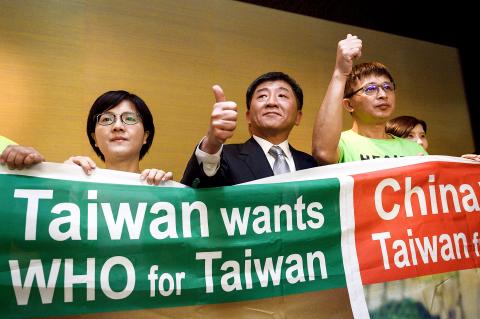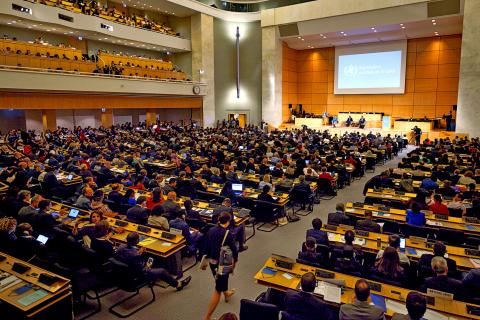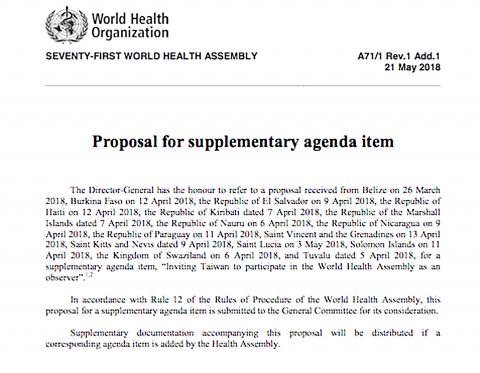Fifteen of Taiwan’s diplomatic allies have voiced support for its attendance at this year’s World Health Assembly (WHA) as an observer, the WHO said yesterday as it opened the first meeting of the 71st WHA in Geneva, Switzerland.
Proposals for a supplementary agenda item “inviting Taiwan to participate in the WHA as an observer” were received last month and earlier this month from Belize, Tuvalu, Nauru, Eswatini, the Marshall Islands, Kiribati, El Salvador, Saint Christopher and Nevis, Nicaragua, Paraguay, the Solomon Islands, Burkina Faso, Haiti, Saint Vincent and the Grenadines and Saint Lucia, the WHO said in a statement.
The proposal has been submitted to the WHA’s General Committee for review, it said.

Photo: AFP
If the assembly decides to discuss the proposal, it would issue documents related to it, the statement said.
The proposals are listed in the form of direct quotes and do not represent the opinions of the WHO Secretariat, a note to the statement said, adding that the WHO addresses Taiwan as “Taiwan, China.”
Representatives from Germany, Honduras and Japan yesterday voiced support for Taiwan to have observer status during their speeches to the assembly as well as, for the first time ever, Canada and New Zealand.

Photo: AFP
Taipei Cultural and Economic Delegation Geneva Office Director-General Bob Chen (陳龍錦) said proposals would be discussed in two-against-two debates, and that four of Taiwan’s allies have agreed to speak for it.
While Eswatini and the Solomon Islands would lobby at the General Committee for Taiwan’s participation, the Marshall Islands and Saint Vincent and the Grenadines would put forward a motion to debate Taiwan’s participation if the committee vetoes the proposal, Chen said.
Taiwan in 1997 began to seek an invitation to the WHA’s annual meetings and was finally invited as an observer in 2009, under the former Chinese Nationalist Party (KMT) administration. It received invitations through 2016.

Photo: CNA, screen grab from the Internet
However, Beijing blocked such invites last year and again this year to show its displeasure with the Democratic Progressive Party administration of President Tsai Ing-wen (蔡英文).

NATIONAL SECURITY THREAT: An official said that Guan Guan’s comments had gone beyond the threshold of free speech, as she advocated for the destruction of the ROC China-born media influencer Guan Guan’s (關關) residency permit has been revoked for repeatedly posting pro-China content that threatens national security, the National Immigration Agency said yesterday. Guan Guan has said many controversial things in her videos posted to Douyin (抖音), including “the red flag will soon be painted all over Taiwan” and “Taiwan is an inseparable part of China,” while expressing hope for expedited “reunification.” The agency received multiple reports alleging that Guan Guan had advocated for armed reunification last year. After investigating, the agency last month issued a notice requiring her to appear and account for her actions. Guan Guan appeared as required,

A strong cold air mass is expected to arrive tonight, bringing a change in weather and a drop in temperature, the Central Weather Administration (CWA) said. The coldest time would be early on Thursday morning, with temperatures in some areas dipping as low as 8°C, it said. Daytime highs yesterday were 22°C to 24°C in northern and eastern Taiwan, and about 25°C to 28°C in the central and southern regions, it said. However, nighttime lows would dip to about 15°C to 16°C in central and northern Taiwan as well as the northeast, and 17°C to 19°C elsewhere, it said. Tropical Storm Nokaen, currently

PAPERS, PLEASE: The gang exploited the high value of the passports, selling them at inflated prices to Chinese buyers, who would treat them as ‘invisibility cloaks’ The Yilan District Court has handed four members of a syndicate prison terms ranging from one year and two months to two years and two months for their involvement in a scheme to purchase Taiwanese passports and resell them abroad at a massive markup. A Chinese human smuggling syndicate purchased Taiwanese passports through local criminal networks, exploiting the passports’ visa-free travel privileges to turn a profit of more than 20 times the original price, the court said. Such criminal organizations enable people to impersonate Taiwanese when entering and exiting Taiwan and other countries, undermining social order and the credibility of the nation’s

‘SALAMI-SLICING’: Beijing’s ‘gray zone’ tactics around the Pratas Islands have been slowly intensifying, with the PLA testing Taiwan’s responses and limits, an expert said The Ministry of National Defense yesterday condemned an intrusion by a Chinese drone into the airspace of the Pratas Islands (Dongsha Islands, 東沙群島) as a serious disruption of regional peace. The ministry said it detected the Chinese surveillance and reconnaissance drone entering the southwestern parts of Taiwan’s air defense identification zone early yesterday, and it approached the Pratas Islands at 5:41am. The ministry said it immediately notified the garrison stationed in the area to enhance aerial surveillance and alert levels, and the drone was detected in the islands’ territorial airspace at 5:44am, maintaining an altitude outside the effective range of air-defense weaponry. Following